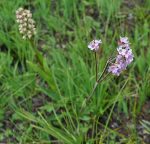 Also called nard, nardin and muskroot, this aromatic herbaceous perennial is native to the montane and subalpine zones of the Himalayas where it grows on steep, grassy slopes. Growing 4-20″ the plants have a taproot with 30-50 brown tapered rhizomes that are covered with the petioles old withered leaves and appear hairy. A lightly hairy stem has 6-8 basal leaves that are slightly hairy and 6-8″ long, and cauline leaves that are opposite, oblong to subovate, and up to 3/4″ long. In early to mid summer, depending on elevation, 3-7 condensed cymes appear bearing 40-50 bell-shaped, pinkish red to bluish white flowers. The fruit that ripens in the fall is covered with short hairs. Spikanard is valued for the highly aromatic amber-colored oil that is distilled from the rhizome. The oil was very expensive and often mixed with other cheaper oils. It was is used as a perfume, incense, sedative, and folk medicine. Photo Credit Ed Shaw
Also called nard, nardin and muskroot, this aromatic herbaceous perennial is native to the montane and subalpine zones of the Himalayas where it grows on steep, grassy slopes. Growing 4-20″ the plants have a taproot with 30-50 brown tapered rhizomes that are covered with the petioles old withered leaves and appear hairy. A lightly hairy stem has 6-8 basal leaves that are slightly hairy and 6-8″ long, and cauline leaves that are opposite, oblong to subovate, and up to 3/4″ long. In early to mid summer, depending on elevation, 3-7 condensed cymes appear bearing 40-50 bell-shaped, pinkish red to bluish white flowers. The fruit that ripens in the fall is covered with short hairs. Spikanard is valued for the highly aromatic amber-colored oil that is distilled from the rhizome. The oil was very expensive and often mixed with other cheaper oils. It was is used as a perfume, incense, sedative, and folk medicine. Photo Credit Ed Shaw
Song of Songs Also called the Song of Solomon, and Canticle of Canticles, this poem is about the spiritual and sexual love between one man and one woman and describes courtship and marriage customs of the times. Although it is sensual it is also interpreted in religious terms as the relationship between God and Israel, or as an allegory of Christ and his bride, the Church.
Song of Songs 1:12 (ESV) The bride recalls a visit with her lover.
“While the king was on his couch, my nard gave forth its fragrance.”
Song of Songs 4: 13 (NIV) The bridgroom describes the garden of his beloved.
“Your plants are an orchard of pomegranates with choice fruits, with henna and nard,”
Song of Songs 4:14 (NIV) The description of the garden continues.
“nard and saffron, calamus and cinnamon, with every kind of incense tree, with myrrh and aloes and all the finest spices.”
Mark 14.3 (NIV) A sinner annoints Jesus.
” While he was in Bethany, reclining at the table in the home of Simon the Leper, a woman came with an alabaster jar of very expensive perfume, made of pure nard. She broke the jar and poured the perfume on his head.”
John 12:3 (NIV) Mary annoints the feet of Jesus
“Then Mary took about a pint of pure nard, an expensive perfume; she poured it on Jesus’ feet and wiped his feet with her hair. And the house was filled with the fragrance of the perfume.””
Spikenard likes full sun, organically rich, medium moist, well-drained soil in USDA Hardiness zones5-8. It is generally healthy and has no significant problems with pests or disease. Propagation is by seed. Spikenard is considered endangered.
The genus name, Nardostachys, comes from Latin nardus, Greek νάρδος, possibly referring to the ancient Assyrian city Naarda, and the Latin word spica, meaning spike, referring to the inflorescence of the plant. The specific epithet, jatamansi, is a Sanskrit word and refers to the hairy appearance of the rhizome.